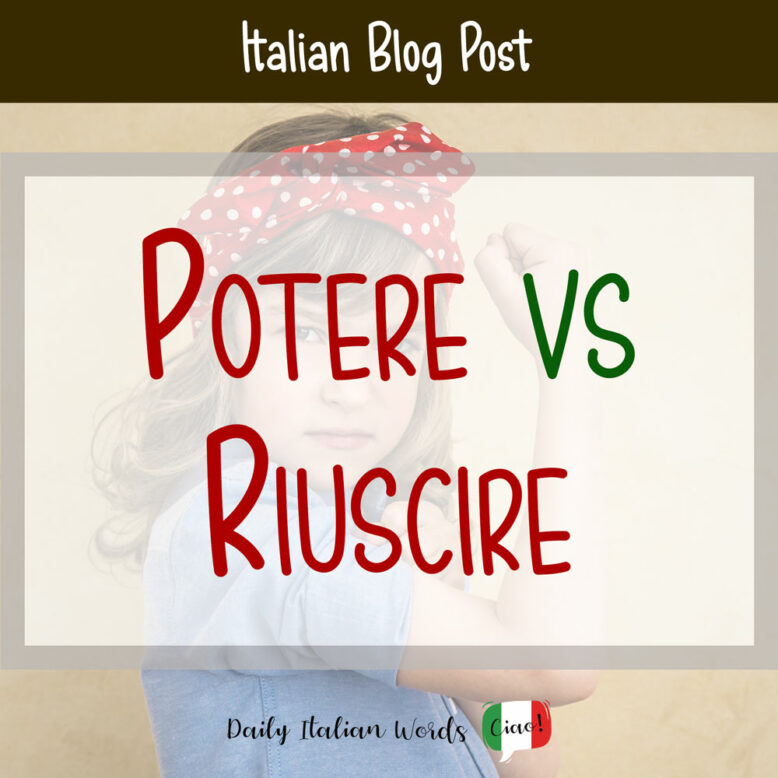Knowing when to use the verbs potere and riuscire in Italian can be challenging for a learner, since both translate as can or to be able to in English. To clear up the confusion, let’s take a look at some of the specific circumstances where each verb is used!

When to use ‘potere’ in Italian
Potere is generally the best choice when talking about capacities and possibilities as in the following examples.
Stai tranquilla. Posso pulire io (la) casa.*
Take it easy. I can clean the house.
(It is possible for me to clean the house.)
*Note: in colloquial speech, Italians often omit the article la when talking about cleaning the house (Devo pulire casa oggi! = I must clean the house today!).
Non può essere vero!
It can’t be true!
(It isn’t possible that it is true!)
Dove posso trovare la stazione dei treni?
Where can I find the train station?
(Where is it possible to find the train station?)
Potere is also used to talk about permission, much like the expression to be allowed to in English.
Posso andare alla festa stasera? – Certo che puoi.
Can/May I go to the party tonight? – Of course you can.
(Am I allowed to go to the party? – Yes, you’re allowed.)

When to use ‘riuscire’ in Italian
Riuscire, on the other hand, refers to a person’s capabilities or abilities. In addition to can and to be able to, it also frequently translates as to manage or to succeed in English.
Non riesco a leggere il cartello. La scritta è troppo piccola.
I can’t read the sign. The writing is too small.
(I don’t have the capability/ability to read the sign.)
Sono riuscito a finire i compiti in tempo.
I was able to finish my homework in time.
(I managed to finish my homework in time. / I successfully finished my homework in time.)
If we compare the two near-identical sentences below, where only the verb changes from potere to riuscire, we get a clear sense of how these two words can communicate completely different meanings.
Non posso bere la vodka.
I can’t drink vodka.
I am not allowed to drink vodka (because I am underage / my parents won’t let me).
Non riesco a bere la vodka.
I can’t drink vodka.
I am not capable of drinking alcohol (because it makes me feel ill).

When ‘potere’ and ‘riuscire’ are similar
You may come across certain situations where there is some overlap between the two verbs, especially in cases where potere clearly does not mean to be allowed.
In the following sentences, for example, the speaker states that he is unable to prepare the dinner. This may be because he has another more pressing obligation or doesn’t feel up to the task, but we can safely assume that it isn’t due to a lack of permission.
Non posso preparare la cena stasera.
I can’t prepare the dinner tonight.
Non riesco a preparare la cena stasera.
I can’t prepare the dinner tonight.

When ‘potere’ and ‘riuscire’ are not similar
Below are some set phrases you will hear on a regular basis in Italian in which potere and riuscire are not interchangeable.
Set phrases with ‘riuscire‘
Italian: Non ci riesco!
English: I can’t do it!
Said when you try to do something but fail.
Italian: Non ci sono riuscito/a.
English: I wasn’t able to do it.
Said when you attempt something but do not succeed.
Italian: Ti riesce bene.
English: You’re doing well / succeeding.
Said as a compliment to someone who is doing something successfully.
Set phrases with ‘potere’
Italian: Che ci posso fare?
English: What can I do about it?
Said when someone asks you to resolve a problem, but you feel unable to do anything about it.
Italian: Non ne posso più!
English: I can’t take it anymore!
Said when you have had enough of something.
Italian: Ma si può?
English: I mean, come on! How ridiculous!
An exclamation in reaction to something that upsets or angers the speaker.

Hopefully this explanation has helped to clarify the differences between potere and riuscire. Just remember that the more you use and hear Italian, the easier it will become to distinguish them!
Heather Broster is a graduate with honours in linguistics from the University of Western Ontario. She is an aspiring polyglot, proficient in English and Italian, as well as Japanese, Welsh, and French to varying degrees of fluency. Originally from Toronto, Heather has resided in various countries, notably Italy for a period of six years. Her primary focus lies in the fields of language acquisition, education, and bilingual instruction.


